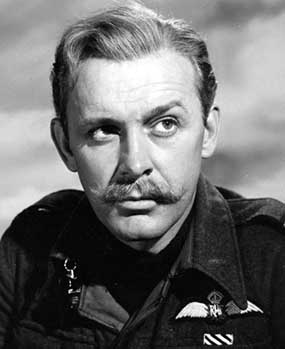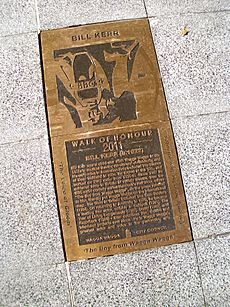Bill Kerr facts for kids
Quick facts for kids
Bill Kerr
|
|
|---|---|
 |
|
| Born |
William Henry Kerr
10 June 1922 Cape Town, Cape Province, South Africa
|
| Died | 28 August 2014 (aged 92) Perth, Western Australia, Australia
|
| Nationality | Australian |
| Occupation |
|
| Years active | 1933–2011 |
| Children | 4 |
William Henry Kerr (born 10 June 1922 – died 28 August 2014) was a talented actor and comedian. He was known for his work in both Britain and Australia.
Bill Kerr started his career as a child actor in Australia. Later, he moved to Britain after World War II. There, he became famous for his comedy roles, especially on the radio show Hancock's Half Hour. In 1979, Kerr returned to Australia. He then began a new career playing serious characters in films and TV shows.
Contents
Bill Kerr's Early Life and Acting Beginnings
Bill Kerr was born in Cape Town, South Africa, on 10 June 1922. His family was involved in performing arts. He grew up in Wagga Wagga, New South Wales, Australia. Bill started in show business when he was very young. His son, Wilton, shared that Bill's mother used him as a baby prop in her shows. This meant he was "literally kind of born to do it."
Kerr began working in radio for the ABC in 1932. He continued playing child roles for about eight years. His first movie role was in Harmony Row (1933). He played a lively young character alongside the famous Australian comedian George Wallace.
His first serious acting role on screen was in the Cinesound film The Silence of Dean Maitland (1934). In this movie, he played a blind child and showed a strong presence. Bill Kerr was one of the most important child actors in early Australian films. During World War II, he served in the Australian army. He also performed in shows for soldiers at home and overseas. He even toured with his friend, the actor Peter Finch.
Bill Kerr's Career in Britain
After the war, Bill Kerr moved to Britain in 1947. For several years, he was a regular on the BBC radio series Variety Bandbox. This show was part of the BBC Light Programme. He kept his Australian accent, which was unusual for performers moving to Britain then. He was known as "the boy from Wagga Wagga." A museum spokesperson from Wagga Wagga said this phrase was very popular with British audiences after the war. They thought "Wagga Wagga" sounded like a funny, magical place far away.
From 1954 to 1959, Bill Kerr had a regular role in the BBC radio comedy Hancock's Half Hour. He played an Australian lodger in the series. The show starred comedian Tony Hancock and also featured Sid James. Bill's character started out sharp but later became more dim-witted. This made him the target of Hancock's jokes. Unlike Sid James, Bill Kerr did not appear in the TV version of Hancock's Half Hour.
Kerr also starred in the radio drama The Flying Doctor (1958–63). He played a character who flew in and out of a made-up base called Wollumboola. He and his "doctor" friend helped bring criminals to justice in the Australian outback. Later, he worked with Sid James again in the TV comedy Citizen James (1960). Bill Kerr also appeared in the Doctor Who serial The Enemy of the World (1968). He acted alongside Patrick Troughton. He also had a long-running role in the early 1960s BBC-TV soap opera, Compact.
Bill Kerr also performed in stage plays. In 1956, he was in a touring show of The Teahouse of the August Moon. He also worked with Spike Milligan in the play The Bed-Sitting Room in 1963 and 1967. In the 1969 London show of Play It Again, Sam, Kerr played the famous actor Humphrey Bogart.
In 1972, he co-starred with Anthony Newley in the musical The Good Old Bad Old Days. This show ran for 309 performances. Later, he had a role in the musical play Cole in 1974. This play was about the music of Cole Porter. He also appeared in several British films. These included The Dam Busters (1955) and The Wrong Arm of the Law (1963).
Bill Kerr's Return to Australia and Later Life
In 1979, Bill Kerr moved back to Australia. He settled in Perth, Western Australia. He started focusing on playing serious characters. He appeared in important Australian films. These included Peter Weir's Gallipoli (1981) and The Year of Living Dangerously (1982). In 1982, Kerr also acted in the film The Pirate Movie.
During the 1980s, he worked on the Australian stage. He was in musicals like My Fair Lady, where he received great reviews. Bill Kerr played real-life Australian military figures three times. He was bomber pilot Micky Martin in The Dam Busters (1955). He played General John Monash in the TV mini-series Anzacs (1985). He also played General Harry Chauvel in the film The Lighthorsemen (1986). Besides serious roles, he continued to appear in comedies. These included the film The Coca-Cola Kid (1985) and Let's Get Skase (2001).
Kerr also appeared in TV shows like Glenview High (1978–79) and Minty (1998). He played Douglas Kennedy in the soap opera The Young Doctors (1980). He was seen as Dave Welles in the Australian mini-series Return To Eden (1983). In this show, he helped Stephanie Harper after she was attacked by a crocodile. He played Dave Welles again in the 1985 series of Return To Eden.
Bill Kerr also narrated several documentaries. These included No Survivor - The Mysterious Loss of HMAS Sydney (1995) and Malice or Mutiny (2003). He also narrated a series for Discovery called Animal X.
On 26 January 2011, Bill Kerr was honored with the 2011 Walk of Honour in Wagga Wagga. His plaque was revealed on 17 May 2011. Bill Kerr passed away at his family home in Perth, Western Australia, on 28 August 2014. He was 92 years old. He had four children.
Filmography
- Harmony Row (1933) - Leonard aka Sonny
- The Silence of Dean Maitland (1934) - Cyril Maitland Jr.
- Penny Points to Paradise (1951) - Digger Graves
- My Death Is a Mockery (1952) - Hansen
- Appointment in London (1952) - Bill Brown
- You Know What Sailors Are (1954) - Lt. Smart
- The Night My Number Came Up (1955) - The Soldier
- The Dam Busters (1955) - Flight Lieutenant H. B. Martin, D.S.O., D.F.C., A.F.C.
- Port of Escape (1956) - Dinty Missouri
- The Shiralee (1957) - (uncredited)
- The Captain's Table (1959) - Bill Coke
- A Pair of Briefs (1962) - Victor - Club Owner
- The Wrong Arm of the Law (1963) - Jack Coombes
- Doctor in Distress (1963) - Australian Sailor
- Doctor in Clover (1966) - Digger
- A Funny Thing Happened on the Way to the Forum (1966) - Gladiator-in-Training
- Doctor Who serial The Enemy of the World (1967-1968, TV Series) - Giles Kent
- Tiffany Jones (1973) - Morton
- Ghost in the Noonday Sun (1973) - Giacomo
- Girls Come First (1975) - Hugh Jampton
- House of Mortal Sin (1976) - Mr. Davey
- The Young Doctors (1980, TV Series) - Douglas Kennedy
- Gallipoli (1981) - Jack
- Save the Lady (1982) - MacDuff
- The Pirate Movie (1982) - Major General
- The Year of Living Dangerously (1982) - Colonel Henderson
- Platypus Cove (1983) - Mr. Anderson
- Dusty (1983) - Tom Lincoln
- Return to Eden (1983, TV Mini-Series) - Dave Welles
- Razorback (1984) - Jake Cullen
- Vigil (1984) - Birdie
- The Settlement (1984) - Kearney
- White Man's Legend (1984) (TV Movie)
- A Fortunate Life (1985, TV Mini-Series) - Narrator
- The Coca-Cola Kid (1985) - T. George McDowell
- Anzacs (1985, TV Mini-Series) - Gen. Monash / General Monash
- Relatives (1985) - Grandpa
- Return to Eden (1986, TV Series) - Dave Welles
- The Lighthorsemen (1987) - Gen. Sir Harry Chauvel
- Running from the Guns (1987) - Gilman
- Bushfire Moon (1987) - Trevor Watson
- Kokoda Crescent (1989) - Russ
- The New Adventures of Black Beauty (1990) - Samuel Burton (in this role he atypically spoke in an impeccable Received Pronunciation accent)
- Sweet Talker (1991) - 'Uncle' Cec
- The River Kings (1991, TV Mini-Series) - Captain Elijah
- Over the Hill (1992) - Maurice
- Snowy (1993)
- No Survivors - The Mysterious Loss of HMAS Sydney (1995, TV)
- Let's Get Skase (2001) - Mitchell Vendieks
- Changi (2001, TV Mini-Series) - Older Eddie
- Peter Pan (2003) - Fairy Guide
- Malice or Mutiny (2003, TV Series)
- Southern Cross (2004) - Tom Casely
- Animal X Natural Mystery Unit (2004–2006, TV Series)
 | May Edward Chinn |
 | Rebecca Cole |
 | Alexa Canady |
 | Dorothy Lavinia Brown |


